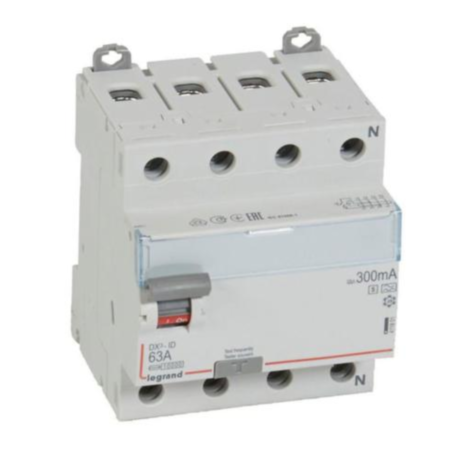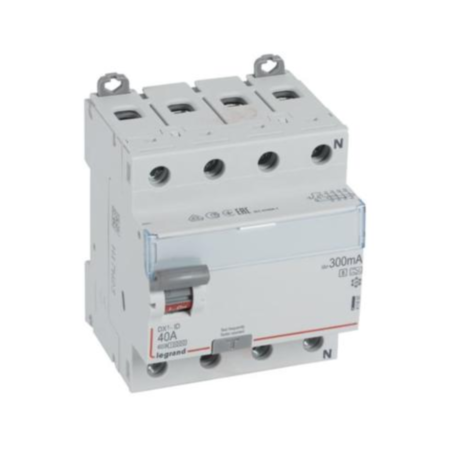Residual Current Circuit Breaker (RCCB) – Overview
A Residual Current Circuit Breaker (RCCB) is a crucial safety device used in electrical installations to prevent electrical shocks and minimize the risk of fire due to earth leakage currents. RCCBs detect imbalances between the live and neutral conductors and disconnect the circuit when a fault is detected, typically caused by an insulation failure or human contact with a live part.
Key Features of RCCBs:
- Protection Against Electric Shock: RCCBs help protect people from electric shock by detecting leakage currents, typically caused by faulty wiring or equipment.
- Prevention of Electrical Fires: By detecting leakage currents that could lead to overheating, RCCBs help reduce the risk of electrical fires.
- Quick Response Time: RCCBs provide rapid disconnection of power in case of an earth fault, ensuring immediate protection.
- Sensitive Trip Mechanism: RCCBs are designed to trip when the leakage current exceeds a preset threshold, typically in the range of 5mA to 30mA, depending on the application.
- No Overload or Short Circuit Protection: RCCBs are specifically designed for earth leakage protection. They do not provide protection against overloads or short circuits, which is why they are often used in conjunction with MCBs or MCCBs.
Applications of RCCBs:
- Residential: Protects households and individuals from electrical hazards caused by faulty appliances, wet environments (like bathrooms), or exposed electrical wiring.
- Commercial: Used in offices, shops, and public buildings to ensure the safety of electrical systems.
- Industrial: In manufacturing plants and factories, RCCBs protect critical equipment and workers from electrical faults.
- Outdoor/Construction: RCCBs are essential on construction sites where workers are exposed to higher electrical risks.
Top RCCB Manufacturers Globally:
- ABB
ABB is a global leader in electrical equipment and automation. Their RCCBs are known for high quality, reliable performance, and advanced safety features, meeting international safety standards like IEC 61008-1. - Schneider Electric
Schneider Electric is one of the most respected brands in electrical protection and automation. Their RCCBs are known for easy installation, long-lasting durability, and protection against electrical hazards. They offer both standard and high-performance models. - Siemens
Siemens produces a wide range of RCCBs that provide excellent protection against leakage currents. Their RCCBs are designed to offer reliable performance and high breaking capacity, making them ideal for both residential and industrial applications. - L&T (Larsen & Toubro)
L&T is an Indian multinational that manufactures RCCBs and other electrical safety devices with a reputation for quality and robustness. Their RCCBs are designed for various applications, from residential to industrial. - Legrand
Legrand is a global specialist in electrical and digital building infrastructures. Their RCCBs provide superior protection against electric shocks and offer ease of installation, with many models available for different current ratings and sensitivities. - Eaton
Eaton offers a broad range of RCCBs with various trip settings, making them suitable for different electrical applications. Known for their reliability and cost-effectiveness, Eaton RCCBs are used globally in residential, commercial, and industrial settings. - Hager
Hager is another renowned manufacturer in the electrical industry, offering RCCBs that ensure protection against leakage currents. Their RCCBs are particularly popular in European markets due to their quality and precision. - L&T – Lauritz Knudsen Electrical and Automation
Known for high-quality industrial and residential electrical protection products, L&T RCCBs feature advanced technology and robust construction to ensure maximum safety against electrical faults.
Factors to Consider When Choosing an RCCB:
- Current Rating: Choose an RCCB that matches the electrical load of your installation.
- Sensitivity: RCCBs come with different sensitivities, typically 30mA for personal protection and 300mA for fire prevention. Choose based on the level of safety required.
- Poles: RCCBs are available in different pole configurations (1P, 2P, 3P), depending on whether you need single-phase or three-phase protection.
- Trip Type: Consider whether you need an RCCB with a standard or selective tripping function, especially for larger or critical installations.
Conclusion:
RCCBs are essential devices that enhance electrical safety by preventing electric shocks and reducing the risk of fires caused by leakage currents. With numerous reliable manufacturers globally, including ABB, Schneider Electric, Siemens, and others, choosing the right RCCB involves evaluating factors such as sensitivity, current rating, and application needs. Always ensure that the RCCB you select complies with local safety standards and is suitable for your specific installation requirements.










